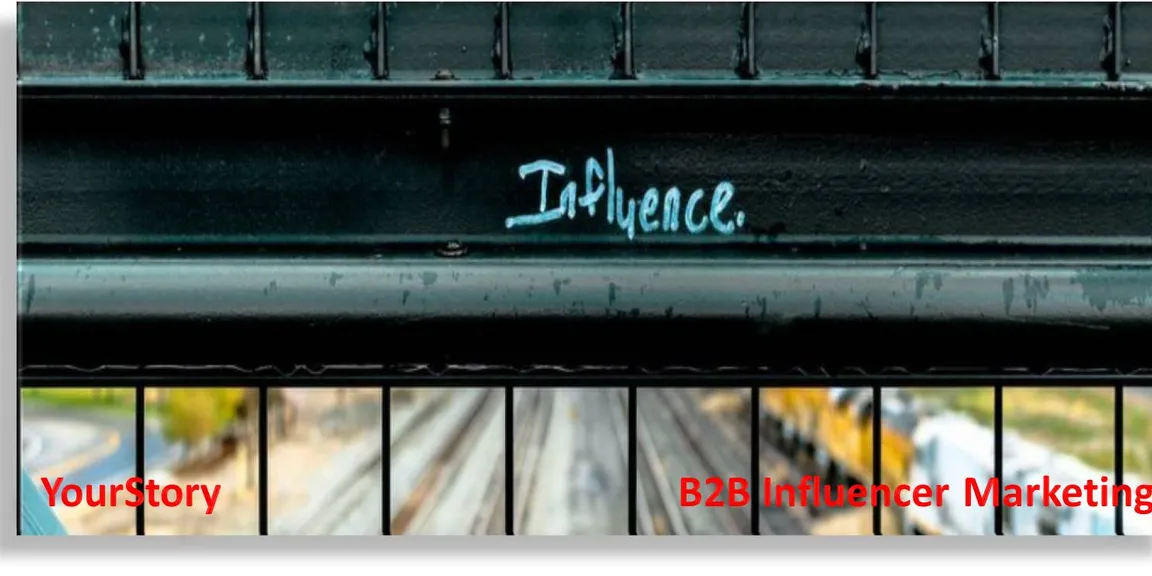

B2B Influencer Marketing - Definition, Meaning and Examples
Influencer marketing also works in B2B - finding a suitable influencer is therefore the central task of the influencer marketing strategy.
Marketing circles have been thrilled with influencer marketing for years. Today's consumer is increasingly ignoring traditional advertising, and recommendations from respected people seem more authentic.
What does Influencer Marketing mean?
Influencer marketing is when a company uses (paid) influencers to promote its brand. These are usually people with recognized expertise, high visibility, and above all, a large and dedicated presence in social media.
The influencer can generate the advertising content himself or he can be co-produced by the brand. This powerful technology is now well established among B2C marketers. And more and more B2B marketers are becoming aware of the idea.
What is a B2B Influencer?
A B2B influencer is different from the typical B2C influencers that operate on YouTube, Twitter or Instagram. A B2B influencer is usually an industry insider, a prominent consumer, a well-known journalist, or the company's employees. A B2B influencer is a person who has a high level of authority and authenticity or a certain impressive expertise in your industry.
If a celebrity from film and television likes your product and talks about it in the social media, that's excellent, but not particularly relevant to your customers. More suitable are people who have bought your product for example for a whole department or company and are convinced of it. In the B2B world, the focus is less on the level of awareness as an influencer of an influencer, much more is his expertise and know-how.
How does Influencer Marketing work in B2B?
The B2B buyer's journey has changed dramatically since the dawn of the Internet, impacting B2B sales and marketing. Gone are the days when the company's sales teams drove the buying process and also the influence over when, what information is presented to those interested.
Now the buyer himself has control over his knowledge of the products and services. The role of the sales team now shifts to the consultant and at best he develops into the influencer in his field of expertise. This makes B2B Influencer Marketing an opportunity for companies and is becoming increasingly important.
Interested parties are looking for expert content to assess their intention to purchase and the product behind it, or the service behind it. Content shared by industry insiders is more credible than pure product descriptions found on a corporate page. In fact, a majority of buyers pay attention to the content of industry influencers more credibility than classic sales teams.
Time Warner Business Class took this route in B2B Influencer Marketing with video credentials from small and medium sized clients. Customers praised Time Warner Kabel as essential to their success and the videos appeared on YouTube, Facebook and Twitter.
Each video ended with a call to action in which viewers were invited to download an eBook that provided more information about what Time Warner Business Class can do for business.
What is different about B2B Influencer Marketing than B2C Influencer Marketing?
B2B shoppers do not usually click on an Instagram post link, go to a corporate website and buy a product. In B2B Influencer Marketing, the process is more complex. Technology and business influencers can not shoot a video on your SaaS platform or take a photo of their factory floors and increase sales in the foreseeable future. Even an influencer with a large fan base on Snapchat or Instagram has little credibility with B2B buyers, unless he works in the same industry - which is not a typical scenario.
What matters in B2B Influencer Marketing?
B2B buyers typically start the buying process by reading reviews, reviewing specifications, and googling for more information. Most B2B transactions are more about long term goals and require a certain amount of engagement, so the sales cycle takes longer.
Potential B2B buyers routinely search among colleagues and do extensive research before making direct contact. This approach is often triggered by a conversation with a colleague. B2B shoppers spend hours, days, and sometimes months exploring a product, asking questions, and getting ideas out of their network.
Another difference between B2C and B2B Influencer Marketing lies in the type of content that customers find convincing. In the B2C, the interests and tastes of ordinary consumers predominate.
Lifestyle contributions and humor can play a big role. In B2B, decision makers are more focused on the specific needs of their business and are characterized by skepticism that accompanies a decision with long-term consequences in the workplace. A trusted third party is especially important to people in their position.
Influencer marketing should be integrated into the marketing mix alongside other marketing measures, as potential customers trust you and believe you are credible.
How to Develop a B2B Influencer Marketing Strategy?
Developing a B2B Influencer Marketing Strategy is a multi-level process . In many ways, the approach is similar to developing an B2C strategy for influencer marketing, but more attention should be paid to those goals, some of which are drastically different.
Determining the goals of your strategy
The first step in developing a strategy is to define your goals. What do you want to achieve for your company, your brand with an influencer campaign? Common B2B and B2C goals include increasing brand awareness, increasing leads, or increasing sales.
Of course, there is a difference between the target groups, as B2B Influencer Marketing is not aimed at private consumers, but rather at decision-makers in B2B. These can be found in most companies in buying centers, which are made up of representatives from various departments with different functions. The decision makers may consist of a large number of people with different interests.
Telling a story
When you have a goal in mind, focus on the story you want to tell about your brand. Who are you? How do your products or services help other companies? What sets you apart from other companies? What do you do differently than your competitors? Why should a buyer choose your offer?
Identify appropriate influencers
Next, you should think about who your ideal influencer might be. What kind of audience does your favorite influencer achieve? What kind of experience does he or she have? What is the influence of this person? Does he or she have a successful blog or a strong social presence? Or maybe you are affiliated with companies that would use your product?
Connect with the influencers
You will then contact the influencers and suggest working together. At this stage, it helps to plan the type of content that will flow into the campaign, and then create a plan for creation, publishing, and distribution.
Measure the results
Once the campaign is complete, your work is not done. Now is the time to measure and track the results. That way you can see what works and what does not. This will give you important information about what changes you may need to make to the next campaign.
How do companies find the right influencer?
Finding the appropriate influencer is one of the key tasks in developing a B2B Influencer Marketing Strategy. Many marketers often use only one data point to determine which group of influencers they are dealing with. That's usually the "reach". The range of an influencer is an important metric, but it is not the only one. Overall, four different metrics must be considered when choosing a B2B Influencer:
- Reach in social media
- Relevance to your products or services
- Resonance and engagement of followers
- References from other influencers
Scope: How big is the influencer's social community on all digital channels - blogs, RSS subscribers, contributed posts? The reach is important because you want to know how far your message is carried by the influencer.
Relevance: How often do influencers relate to topics and keywords that suit your business or describe your industry? What topics does an influencer write about? Match the content to your brand philosophy, to your company values and products. Crucial is the quality of the content. Relevance is a metric that either confirms that the influencer often deals with or reveals their issues, that at some point the influencer shared only one article and then left the conversation.
Resonance: Does the influencer regularly use his influence? Are backgrounds illuminated and discussed, opinions exchanged with others? Are others busy? Influential influencers are actively involved in forming opinions. This metric helps separate real influencers from those who have a large social community but hardly generate engagement with their audience. In some cases, you can filter out those influencers who resort to dodgy tactics that make them seem more influential than they actually are.
References: Are the favorite influencers referenced by other influencers? In other words, do the other influencers in your community share content, comment on, like or retweet content?
A great way to connect with your influencers without straining your marketing budget greatly, is up to them to share in social media . Start by liking their content, share it, and comment on the posts that are relevant to your business and your audience.
Maintain a culture of sharing . Once you have established a relationship with an influencer, you should empower your entire team, especially your most active salespeople, to share the content you create with the activities of the influencer, be it an interview on your corporate blog, an infographic, or a simple one Link to her latest article. This will help you gain extra reach for the content of your business while increasing the impact of the industry expert you have established a relationship with in a very "human" way.
Helpful tools in the search for B2B influencers
Once you have the unique story of your brand, you should use one or the other tool on the web to find the right influencer. The following tools can help you find the people who share your passion and expertise in key categories that relate to your business.
BuzzStream: With BuzzStream you can search, prioritize and find contact information for top influencer on any topic. The platform also tracks your conversations and follow-ups with influencers and supports team collaboration. With BuzzStream, you can turn a webpage or blog entry into a contact record in your database. For example, if you bookmark an influential journalist's article, BuzzStream will automatically collect all e-mail addresses and social profiles associated with that journalist. You can then contact the influencer directly from the platform.
Onalytica: Onalytica is a platform that enables both biography search and content search. If you're looking for an influencer - an editor, journalist, or engineer - who talks about "artificial intelligence," you can easily find it on Onalytica and view the content in real time. Upload or link any content to your topic Onalytica's algorithm finds the top influencers, and Onalytica demonstrates the power of its tool by creating data-driven lists like the Top 100 B2B Marketing Influencers.
Upfluence: Upfluence is an all-in-one solution for B2B Influencer Marketing. This influencer marketing tool offers many different choices, from choosing relevant influencers, to managing your campaigns, to monitoring their performance. Upfluence has an extensive self-reported database of over 1 million influencers that can be selected using advanced keyword combinations and filters such as geo-location, social and social metrics.
Other tools to help you with your B2B Influencer Marketing Campaign:
- kred
- Crowd Fire
- Little bird
- Muck rack
- ContentMarketer.io
- Inkybee
- Group high
- BlogDash
Examples of successful B2B Influencer Marketing
The following examples show how companies worldwide use B2B Influencer Marketing successfully. That I am dealing with large companies is pure coincidence. It does not mean that B2B Influencer Marketing is only a suitable marketing tool for international corporations.
SAP: SAP is the leader in enterprise software with thousands of enterprise customers benefiting from their solutions. How does SAP use Influencer Marketing? SAP influencers are top executives and industry experts.
It is well known that SAP invites its influencers to events that help them increase their social engagement and brand awareness. For example, at an event in Germany, SAP invited five influencers to discuss topics such as machine learning, data analysis and IoT.
These influencers have consumed 50 percent of all social media mentions about this event. For another event in Florida, SAP has worked with eleven influencers. Influencers reached between 80,000 and 100,000 people online via live video streaming.
The influencers went live and answered questions from interested parties who were unable to attend the event. Later, SAP used this content in its blogs and social media profiles.
American Express: American Express is one of the top companies that invest heavily in B2C and B2B marketing. From collaboration with celebrities to micro-influencers, AmEx has left no stone unturned in influencer marketing. The company has run numerous influencer marketing campaigns to attract both corporate clients and consumers.
For example, American Express worked with influential bloggers to reach small businesses. The campaign was called Love My Store. The aim was to let customers know that even small businesses accept credit cards. The campaign resulted in the distribution of 400,000 Amex decals and earned 5 million impressions.
#AmexAmbassador is a B2B Influencer marketing campaign from American Express. The deployed B2B influencers help attract executives and companies to American Express's premium services.
Landis + Gyr: Landis + Gyr is an example of how a company's employees are used in B2B Influencer Marketing. Landis + Gyr launched a pilot program to create employee lawyers active in social media.
The focus was on using the social channels of these employees to communicate customer focus, innovative spirit and other values of the company. The results of this pilot project were surprising even for the company. The campaign resulted in 1,500 engagements and 1,800 content shares.
Andritz Pumps : Andritz AG has also managed to operate successful Influencer Marketing - and at no cost. In a practical lecture with a panel discussion at dmexco 2018 Uwe Seebacher, Global Director of Marketing, Communications and Strategy, is the company's strategy. Influencer marketing must identify those people who act as opinion leaders - not always an easy task.
How Andritz AG has proceeded here, what role the customer journey and the decision-making journey play in it, and which challenges companies are facing, he explains in the video. Andritz AG proves in an impressive way that even medium-sized B2B companies without large marketing budgets can fall back on influencer marketing.
Voith: Hydropower specialist Voith sets an example for Influencer Marketing in the B2B sector with its #DiscoverHydropower Influencer Tour. Behind the campaign is a journey to innovative hydroelectric power plants across Europe. Six days, four influencers, three countries, one adventure - that might sound like an action movie at first, rather than B2B communication. And that's exactly why it worked so well.
The Benefits of B2B Influencer Marketing
The word "influencer" almost always conjures up associations with the B2C world in which young fashionistas and beauty bloggers promote the products of mostly well-known brands. Maybe that's why B2B Influencer Marketing has made slow progress so far and is still viewed with a high degree of skepticism.
However, studies and the successful B2B Influencer marketing campaigns by well-known and lesser-known companies show that B2B Influencer Marketing can help your business by connecting you to an audience that you would otherwise find difficult to reach.
This is especially true if your business, brand and products are still unknown. By working with an influencer you can use the existing network of the influencer and expand your customer base and connect with companies that were previously unreachable.


